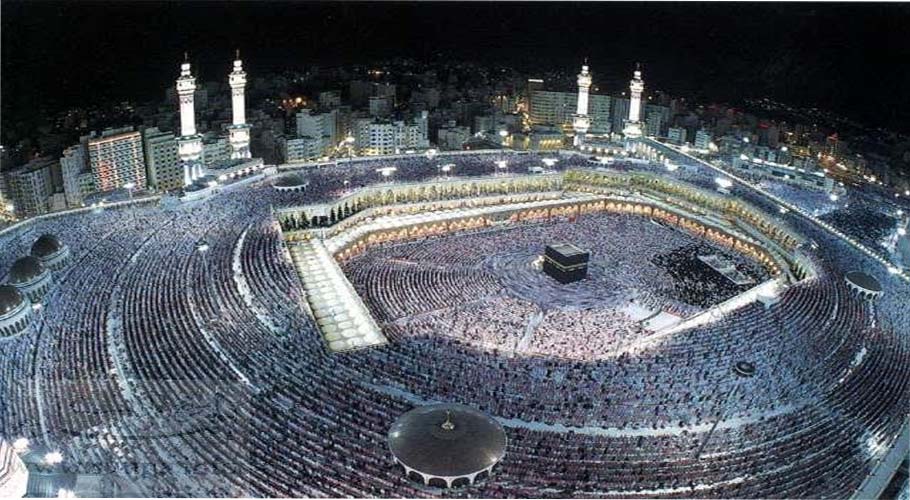There are five pillars of Islam. The first is to testify that there is no god but Allah and that Muhammad (peace be upon him) is the last messenger of Allah. Establishing the second prayer, paying the third Zakat, fasting the fourth Ramadan, and performing the last Hajj, the edifice of Islam stands on these five pillars.
The last member of Islam is Hajj, which belongs to Bait-ul-Sharif, which is in Makkah which every Muslim prays facing five times and this duty is a once-in-a-lifetime obligation for every Muslim who has the strength to go there.
There is a Holy saying, “And it is obligatory on the people to perform Hajj to the house of the person who has the power to reach it.” (Al-Imran)
Let us examine the religious significance and obligation of Hajj.
Center of revelation
Hajj brings about a wonderful revolution in the life of a believer as he visits a house which Allah Almighty has made the center of guidance and which has been the center of revelation. The believer observes the land from which the revelation originated.
“Read in the name of your Lord, the Creator of all things.”
“Today I have completed your religion for you and I have done good to you and I have chosen Islam for you.” (Al-Ma’idah)
When did Hajj become obligatory?
There is a difference of opinion among most of the scholars regarding the fifth pillar of Islam. Some scholars say that Hajj became obligatory in the year 5 AH while others say that Hajj became obligatory in the year 6 AH. It is said that Hajj became obligatory at the end of the year 9 AH.
In the Holy Qur’an, Allah says:
Hajj to the Ka’bah is necessary for people to please Allah, for everyone who can go there, and Allah is free from all worldly needs. (Al-Imran verse 97)
Since this command was revealed at the end of the year, it can be assumed that Hajj became obligatory on Muslims in the year 9 AH. It may be recalled that in the year 9 AH, the Holy Prophet (PBUH) had sent Hazrat Abu Bakr Siddiq as the Ameer of the Muslims so that he could perform the Hajj for the Muslims and then in the year 10 AH he himself had to fulfill the divine command. Went for Hajj, it was the first and last Hajj of the life of the Holy Prophet (PBUH) because after this Hajj, the face of the Holy Prophet (PBUH) was enlightened and the light on his existence covered him from this world.
Religious significance of Hajj
Hajj is the fifth most important part of the religion of Islam which is obligatory on every person with a curriculum vitae.
This group of acts of worship as a whole is called Hajj and all acts of worship are called rituals of Hajj. In the Holy Qur’an, Allah has said:
The Hajj of this House (Ka’bah of Allah) is obligatory upon the people for the sake of Allah. (Verse No. 97 of Surah Al-Imran)
Some people do not perform Hajj despite their ability, physical ability and money, which is strictly promised in Islam. It is stated in the hadith that a person who has the necessary equipment for Hajj and has a ride that can take him to the House of Allah, if he still does not perform Hajj, it does not matter whether he dies as a Jew or a Christian.
It is clear from the hadith that a person who does not perform Hajj is a disobedient servant of God, whose conversion to Islam or believing in God does not make any difference to him, while the name of Islam is to follow the will of God. Along with heaven or hell, Allah Almighty decides whether a person is a disbeliever or a believer.
Short method of performing Hajj
Every year, Muslims from all over the world flock to Saudi Arabia in large numbers. During the Tawaf, the pilgrims raise their voices loudly and, if possible, kiss the Black Stone, which is meant to follow the Sunnah of the Prophet (peace and blessings of Allaah be upon him).
After Tawaf and Qadoom, the pilgrims leave for Mina, where the day of Al-Tarwiyah is spent. Then there is a 1-day break in Arafat Square. This day is called the day of Arafa, the day of Sa’i and the day of Eid-ul-Adha. Then the pilgrims throw stones at the devil, after which the Tawaf is extended in Makkah.
After the Tawaf of Afaza, the pilgrims go to Mina where they spend the days of Tashreeq, after which they return to Mecca. After the farewell tawaf, the rites of Hajj are completed.
Virtue of Hajj
This year Hajj will be on Friday and some people think that Friday Hajj is called Hajj Akbar. In the Quran, the word Hajj Akbar is used in comparison to Umrah. The great virtue of Friday Hajj is mentioned. It is said in reliable books that Friday Hajj is seventy degrees better.
It should be kept in mind that most of the scholars are of the opinion that the hadiths that are found regarding the virtue of Hajj Akbar are not authentic. But remember that in terms of days, Friday has a special virtue and in some places it has been called a small Muslim Eid.

































